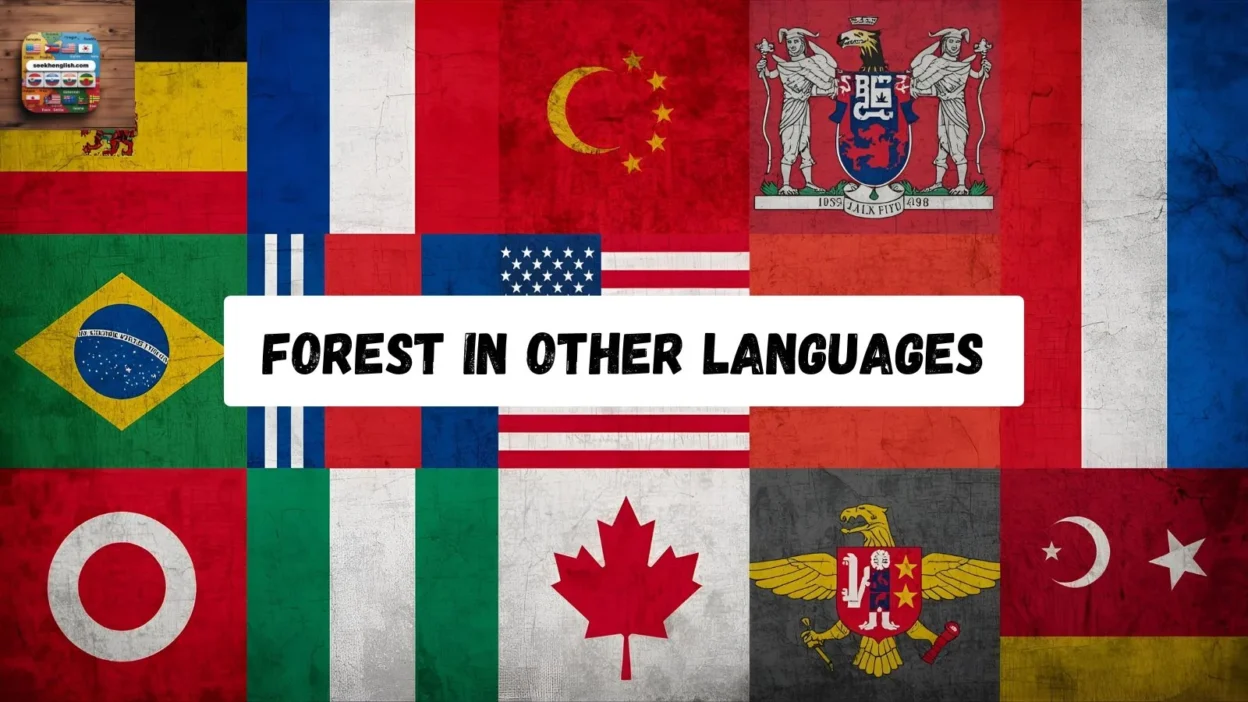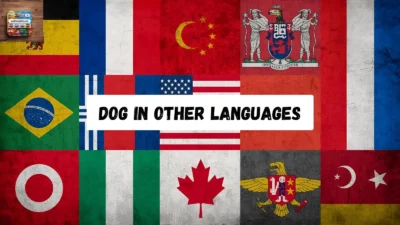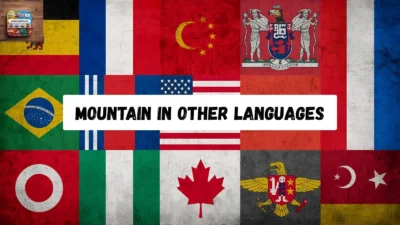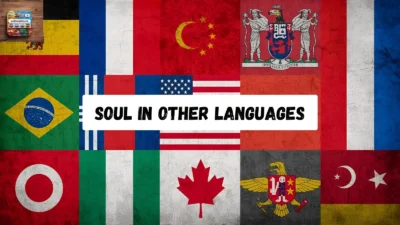The word “forest” refers to a large area covered mainly with trees, plants, and wildlife. Learning how to say forest in different languages can help travelers, students, writers, and nature lovers connect with people from diverse cultures. In this guide, you’ll find 650+ translations of the word “forest” with simple English pronunciations and example sentences to make learning easier. Forest in Other Languages.
How to Say “Forest” in 650 Different Languages
Read More: Ways to Say “Freedom in Other Languages”
- English (🇺🇸) – Forest | Pronunciation: foh-rest | Example: I love walking in the forest during autumn.
- Spanish (🇪🇸) – Bosque | Pronunciation: bos-keh | Example: El bosque está lleno de vida. (The forest is full of life.)
- French (🇫🇷) – Forêt | Pronunciation: foh-reh | Example: La forêt est magnifique au printemps. (The forest is beautiful in spring.)
- German (🇩🇪) – Wald | Pronunciation: vahld | Example: Der Wald ist sehr ruhig. (The forest is very quiet.)
- Italian (🇮🇹) – Foresta | Pronunciation: foh-reh-stah | Example: La foresta è piena di animali. (The forest is full of animals.)
- Portuguese (🇵🇹) – Floresta | Pronunciation: flo-res-tah | Example: A floresta tropical é incrível. (The tropical forest is amazing.)
- Russian (🇷🇺) – Лес (Les) | Pronunciation: lyes | Example: Мы гуляли в лесу. (We walked in the forest.)
- Mandarin Chinese (🇨🇳) – 森林 (Sēnlín) | Pronunciation: sen-leen | Example: 这片森林很大。 (This forest is huge.)
- Japanese (🇯🇵) – 森林 (Shinrin) | Pronunciation: sheen-reen | Example: この森林は美しいです。 (This forest is beautiful.)
- Korean (🇰🇷) – 숲 (Sup) | Pronunciation: soop | Example: 숲 속에 새들이 많아요. (There are many birds in the forest.)
- Arabic (🇸🇦) – غابة (Ghabah) | Pronunciation: gha-bah | Example: الغابة مليئة بالأشجار. (The forest is full of trees.)
- Hindi (🇮🇳) – जंगल (Jangal) | Pronunciation: jun-gul | Example: जंगल में बहुत सारे जानवर रहते हैं। (Many animals live in the forest.)
- Bengali (🇧🇩) – বন (Bon) | Pronunciation: bon | Example: বনের মধ্যে অনেক পাখি আছে। (There are many birds in the forest.)
- Turkish (🇹🇷) – Orman | Pronunciation: or-man | Example: Orman çok sessizdi. (The forest was very quiet.)
- Greek (🇬🇷) – Δάσος (Dasos) | Pronunciation: da-sos | Example: Το δάσος είναι πράσινο. (The forest is green.)
- Dutch (🇳🇱) – Bos | Pronunciation: bohs | Example: Het bos is prachtig in de herfst. (The forest is beautiful in autumn.)
- Swedish (🇸🇪) – Skog | Pronunciation: skoog | Example: Skogen är full av djur. (The forest is full of animals.)
- Norwegian (🇳🇴) – Skog | Pronunciation: skohg | Example: Skogen er stille om natten. (The forest is quiet at night.)
- Danish (🇩🇰) – Skov | Pronunciation: skov | Example: Skoven er meget smuk. (The forest is very beautiful.)
- Finnish (🇫🇮) – Metsä | Pronunciation: met-sah | Example: Metsä on täynnä lintuja. (The forest is full of birds.)
- Polish (🇵🇱) – Las | Pronunciation: lahs | Example: Las jest bardzo stary. (The forest is very old.)
- Czech (🇨🇿) – Les | Pronunciation: les | Example: Les je klidné místo. (The forest is a peaceful place.)
- Slovak (🇸🇰) – Les | Pronunciation: les | Example: Les je plný stromov. (The forest is full of trees.)
- Hungarian (🇭🇺) – Erdő | Pronunciation: air-dur | Example: Az erdő gyönyörű tavasszal. (The forest is beautiful in spring.)
- Romanian (🇷🇴) – Pădure | Pronunciation: pah-doo-reh | Example: Pădurea este liniștită. (The forest is peaceful.)
- Ukrainian (🇺🇦) – Ліс (Lis) | Pronunciation: lees | Example: Ми гуляли в лісі. (We walked in the forest.)
- Belarusian (🇧🇾) – Лес (Les) | Pronunciation: lyes | Example: Лес вельмі прыгожы. (The forest is very beautiful.)
- Serbian (🇷🇸) – Шума (Šuma) | Pronunciation: shoo-mah | Example: Шума је пуна живота. (The forest is full of life.)
- Croatian (🇭🇷) – Šuma | Pronunciation: shoo-mah | Example: Šuma je prekrasna u proljeće. (The forest is beautiful in spring.)
- Bosnian (🇧🇦) – Šuma | Pronunciation: shoo-mah | Example: Šuma je mirna i tiha. (The forest is calm and quiet.)
- Slovenian (🇸🇮) – Gozd | Pronunciation: gozd | Example: Gozd je poln živali. (The forest is full of animals.)
- Bulgarian (🇧🇬) – Гора (Gora) | Pronunciation: go-rah | Example: Гората е зелена и красива. (The forest is green and beautiful.)
- Macedonian (🇲🇰) – Шума (Šuma) | Pronunciation: shoo-mah | Example: Шумата е тивка и мирна. (The forest is quiet and peaceful.)
- Estonian (🇪🇪) – Mets | Pronunciation: mets | Example: Mets on täis linde. (The forest is full of birds.)
- Latvian (🇱🇻) – Mežs | Pronunciation: mezsh | Example: Mežs ir ļoti skaists. (The forest is very beautiful.)
- Lithuanian (🇱🇹) – Miškas | Pronunciation: meesh-kas | Example: Miškas yra pilnas gyvybės. (The forest is full of life.)
- Icelandic (🇮🇸) – Skógur | Pronunciation: skoh-gur | Example: Skógurinn er friðsæll staður. (The forest is a peaceful place.)
- Irish (🇮🇪) – Foraois | Pronunciation: for-esh | Example: Tá an fhoraois álainn. (The forest is beautiful.)
- Welsh (🏴) – Coedwig | Pronunciation: koyd-wig | Example: Mae’r goedwig yn llawn adar. (The forest is full of birds.)
- Scottish Gaelic (🏴) – Coille | Pronunciation: koy-lyuh | Example: Tha a’ choille brèagha. (The forest is beautiful.)
- Maltese (🇲🇹) – Foresta | Pronunciation: foh-res-tah | Example: Il-foresta hija sabiħa ħafna. (The forest is very beautiful.)
- Hawaiian (🇺🇸) – Ulu Lāʻau | Pronunciation: oo-loo lah-ah-oo | Example: ʻO ka ulu lāʻau he nani loa. (The forest is very beautiful.)
- Samoan (🇼🇸) – Vaomatua | Pronunciation: vao-ma-too-ah | Example: O le vaomatua e tele manu. (The forest has many animals.)
- Tongan (🇹🇴) – Vaomatua | Pronunciation: vao-ma-too-ah | Example: ʻOku ʻi he vaomatua e ngaahi fuʻuʻakau. (The forest has big trees.)
- Fijian (🇫🇯) – Veikau | Pronunciation: vay-kow | Example: E levu na veikau e Viti. (There are many forests in Fiji.)
- Maori (🇳🇿) – Ngahere | Pronunciation: ngah-heh-reh | Example: He maha ngā manu i te ngahere. (There are many birds in the forest.)
- Yoruba (🇳🇬) – Igbo | Pronunciation: eeg-boh | Example: Igbo naa kun fun eranko. (The forest is full of animals.)
- Igbo (🇳🇬) – Ọhịa | Pronunciation: oh-hyah | Example: Ọhịa jupụtara na ndụ. (The forest is full of life.)
- Hausa (🇳🇬) – Daji | Pronunciation: dah-jee | Example: Dajin nan ya cika da dabbobi. (This forest is full of animals.)
- Swahili (🇰🇪) – Msitu | Pronunciation: msee-too | Example: Msitu umejaa wanyama. (The forest is full of animals.)
- Zulu (🇿🇦) – Ihlathi | Pronunciation: ee-hlah-tee | Example: Ihlathi ligcwele izilwane. (The forest is full of animals.)
- Xhosa (🇿🇦) – Ihlathi | Pronunciation: ee-hlah-tee | Example: Ihlathi linezilwanyana ezininzi. (The forest has many animals.)
- Sesotho (🇱🇸) – Moru | Pronunciation: moh-roo | Example: Moru o moholo haholo. (The forest is very big.)
- Tswana (🇧🇼) – Moru | Pronunciation: moh-roo | Example: Moru o tletse diphoofolo. (The forest is full of animals.)
- Shona (🇿🇼) – Sango | Pronunciation: sahn-go | Example: Sango rine mhuka dzakawanda. (The forest has many animals.)
- Chichewa (🇲🇼) – Nkhalango | Pronunciation: nkhah-lan-go | Example: Nkhalango ili ndi nyama zambiri. (The forest has many animals.)
- Amharic (🇪🇹) – ጫካ (Chaka) | Pronunciation: cha-kah | Example: ጫካው በጣም ቆንጆ ነው። (The forest is very beautiful.)
- Somali (🇸🇴) – Kayn | Pronunciation: kine | Example: Kaynku waa qurux badan yahay. (The forest is beautiful.)
- Tigrinya (🇪🇷) – ጫካ (Chaka) | Pronunciation: cha-kah | Example: ጫካው ቆንጆ እዩ። (The forest is beautiful.)
- Kinyarwanda (🇷🇼) – Ishyamba | Pronunciation: ee-shyam-bah | Example: Ishyamba ririmo inyoni nyinshi. (The forest has many birds.)
- Kirundi (🇧🇮) – Ishamba | Pronunciation: ee-sham-bah | Example: Ishamba ririmwo ibikoko vyinshi. (The forest has many animals.)
- Malagasy (🇲🇬) – Ala | Pronunciation: ah-lah | Example: Ala dia feno biby maro. (The forest is full of animals.)
- Twi (🇬🇭) – Kwae | Pronunciation: kwah-eh | Example: Kwae no yɛ fɛ paa. (The forest is very beautiful.)
- Akan (🇬🇭) – Kwae | Pronunciation: kwah-eh | Example: Kwae no yɛ kɛse. (The forest is big.)
- Ewe (🇹🇬) – Agbo | Pronunciation: ahg-boh | Example: Agbo la ɖe kpoo. (The forest is deep.)
- Fula (🇸🇳) – Wuro | Pronunciation: woo-roh | Example: Wuro maa jogi laawol. (The forest is near the river.)
- Wolof (🇸🇳) – Guéy | Pronunciation: gway | Example: Guéy bi am na ay jàngalé. (The forest has many animals.)
- Bambara (🇲🇱) – Fɔlɔ | Pronunciation: foh-loh | Example: Fɔlɔ be kɛla nyogon. (The forest is growing.)
- Mandinka (🇬🇲) – Folo | Pronunciation: foh-loh | Example: Folo la taa baake. (The forest is very big.)
- Krio (🇸🇱) – Bush | Pronunciation: boosh | Example: Di bush get plenti animol. (The forest has many animals.)
- Tok Pisin (🇵🇬) – Bus | Pronunciation: boos | Example: Bus i gat planti pisin. (The forest has many birds.)
- Māori (🇳🇿) – Wao | Pronunciation: wah-oh | Example: Kei roto i te wao ngā rākau. (There are trees in the forest.)
- Cherokee (🇺🇸) – ᏣᎳᎩ ᎤᏙᏢᏒ (Tsalagi Udohlvsv) | Pronunciation: tsa-la-gee oo-doh-luh-soo | Example: ᎤᏙᏢᏒ ᎠᎩᎦᎡᎯᏓ. (The forest is quiet.)
- Navajo (🇺🇸) – Ch’óoshchíí’ | Pronunciation: choh-sh-chee | Example: Ch’óoshchíí’ dóó níłch’i’ baa dah si’ání. (The forest is full of wind.)
- Quechua (🇵🇪) – Sach’a | Pronunciation: sah-cha | Example: Sach’aqa achka sach’uniyuqmi. (The forest has many trees.)
- Aymara (🇧🇴) – Sach’a | Pronunciation: sah-cha | Example: Sach’a ukhamawa wali suma. (The forest is very beautiful.)
- Guarani (🇵🇾) – Ka’aguy | Pronunciation: kah-ah-goo-ee | Example: Ka’aguy oĩ heta mymba rehegua. (The forest has many animals.)
- Mapudungun (🇨🇱) – Ruka | Pronunciation: roo-kah | Example: Ruka mew ñi pu wülfi. (The forest has many birds.)
- Tzotzil (🇲🇽) – Ch’en | Pronunciation: chen | Example: Ch’en ta ch’ulal. (The forest is green.)
- Nahuatl (🇲🇽) – Kuauhtla | Pronunciation: kwow-tlah | Example: Kuauhtla ipan tepetl. (The forest is near the mountain.)
- Mayan (🇲🇽) – K’áax | Pronunciation: kah-ash | Example: K’áax le ba’ax k’inam. (The forest is beautiful.)
- Hmong (🇱🇦) – Hav Zoov | Pronunciation: hah-zoh | Example: Peb mus hav zoov ua si. (We go play in the forest.)
- Lao (🇱🇦) – ປ່າ (Pàa) | Pronunciation: pah | Example: ປ່າເປັນທີ່ສວຍງາມ. (The forest is beautiful.)
- Thai (🇹🇭) – ป่า (Pà) | Pronunciation: pah | Example: ป่ามีสัตว์มากมาย. (The forest has many animals.)
- Khmer (🇰🇭) – ព្រៃ (Prey) | Pronunciation: prey | Example: ព្រៃនេះស្រស់ស្អាតណាស់។ (This forest is very beautiful.)
Conclusion
Forests symbolize life, peace, and nature’s beauty, and learning how to say “forest” in 650+ different languages connects us with diverse cultures worldwide. No matter where you travel, the word “forest” reminds us of our shared love for nature and the importance of preserving it for future generations.
“No matter where you go in the world, the word ‘forest’ always carries life, beauty, and respect.”



